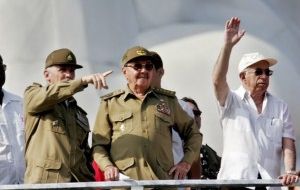MercoPress. South Atlantic News Agency
Cuban reforms “step by step” at the “rhythm we determine” says Castro regime
 The strong message was given by Vice-president Jose Ramon Machado Ventura with Raul Castro in first line.
The strong message was given by Vice-president Jose Ramon Machado Ventura with Raul Castro in first line. The Cuban leadership on the 57th anniversary of the revolution said that economic reforms will take place “step by step, at the pace we determine” and certainly not “by campaigns from the foreign press”.
The nationally televised speech by Vice-president Jose Ramon Machado Ventura was interpreted as a stern reply to those pushing for faster change in a country that is overwhelmed by the economic crisis and forced to spend billions of US dollars in expensive food imports.
Machado Ventura, a veteran of the revolution and long-time Castro loyalist was the speaker at the main celebration of the Castro revolution: the start of the armed uprising 26 July 1953 marked by the assault on the Moncada military barracks that put Fidel Castro in power in 1959.
President Raul Castro was expected to speak, but he was only a spectator at the event and older brother Fidel Castro, who has re-emerged in recent weeks after four years in seclusion, did not attend.
“We will proceed with a sense of responsibility, step by step, at the rhythm we determine, without improvisation or haste so as not to make mistakes,” Machado Ventura said to a crowd estimated at 90,000 in the central city of Santa Clara.
“We will continue the study, the analysis and the taking of decisions that lead to overcoming our deficiencies,” he said. “We will not conduct ourselves by campaigns of the foreign press.”
The Moncada attack failed with many of the rebels killed, but it marked the beginning of the end for the government of US-backed dictator Fulgencio Batista, who fled the country on January 1, 1959.
“Today we confirm the commitment with them to be loyal to the ideas for which they gave their lives,” Machado Ventura said, referring to those who died in the assault.
Even though President Castro, 78, did not speak as he has in past July 26 celebrations, Machado Ventura's words echoed his earlier pronouncements that the government must act deliberately to avoid mistakes that could endanger the future of the Cuban regime when the current generation of leaders is gone.
Machado Ventura, 79, cited three 2008 hurricanes and the longstanding US trade embargo against the island as principal causes for Cuba's current economic lethargy.
Raul Castro surprised many earlier this month by agreeing to release 52 political prisoners in a deal with the Catholic Church that quieted international criticism about Cuba's human rights record.
Machado Ventura did not mention the release of the prisoners, who Cuban leaders view as mercenaries working with the United States to topple the communist government.
There had been expectations that Fidel Castro, 83, might attend the event since he recently reappeared after undergoing intestinal surgery in July 2006. Fidel ceded power provisionally to his brother at the time of surgery. He resigned in February 2008 and Raul Castro was elected his successor by the National Assembly.
However in spite of the warning under Raul Castro there have been some reforms and a reshuffling of the cabinet, the latest of which the long-serving health minister, Jose Ramon Balaguer, 78 who rejoined the powerful Central Committee of the Communist Party.
Balaguer had held the post since 2004, when he was a surprising choice to replace Damodar Pena, an official made health minister in 2002 as part of a then effort to promote younger leaders.
Trained as a physician, Balaguer was a founding member of Cuba's Communist Party and has been an ideological hard-liner for decades. Replacing him will be 43-year-old Roberto Morales, a fellow physician who had been first vice minister of health.
Cuba provides free health care for all citizens, making the health minister an influential position — but the Cabinet shake-up was one of many of late. In June, Cuba fired its transportation minister for professional mistakes and replaced the head of the Sugar Ministry after he admitted incompetence.
Those moves came after the March 23 replacement of Attorney General Juan Escalona Reguera, who fought under Fidel and Raul Castro in the rebel army that toppled Batista. Also in March, Rogelio Acevedo, who as a teenager fought alongside the Castro brothers and Ernesto “Che” Guevara, was abruptly dismissed as the overseer of Cuba's airlines and airports for unexplained reasons.
Cuba also awarded land to farmers to toil and market privately hoping to increase food production and cut the staggering import bill for the exhausted Cuban Treasury. Food subsidies are also being phased out.




Top Comments
Disclaimer & comment rules-

-

Read all commentsThe Cuban Tango: (Leading with the left foot) one step forward, shuffle, slither, squirm to the left as far as possible, then as many steps backward as it takes to return to the stone age. Repeat ad nauseam, or until Fidel croaks, hopefully soon.
Jul 27th, 2010 - 05:58 am 0Pathetic...
Surely the pace is step by step as they can be afforded.
Jul 27th, 2010 - 11:17 am 0Notice how all the individuals mentioned are old! When they've all croaked, perhaps Cuba will regain its direction, and its freedom.
Commenting for this story is now closed.
If you have a Facebook account, become a fan and comment on our Facebook Page!